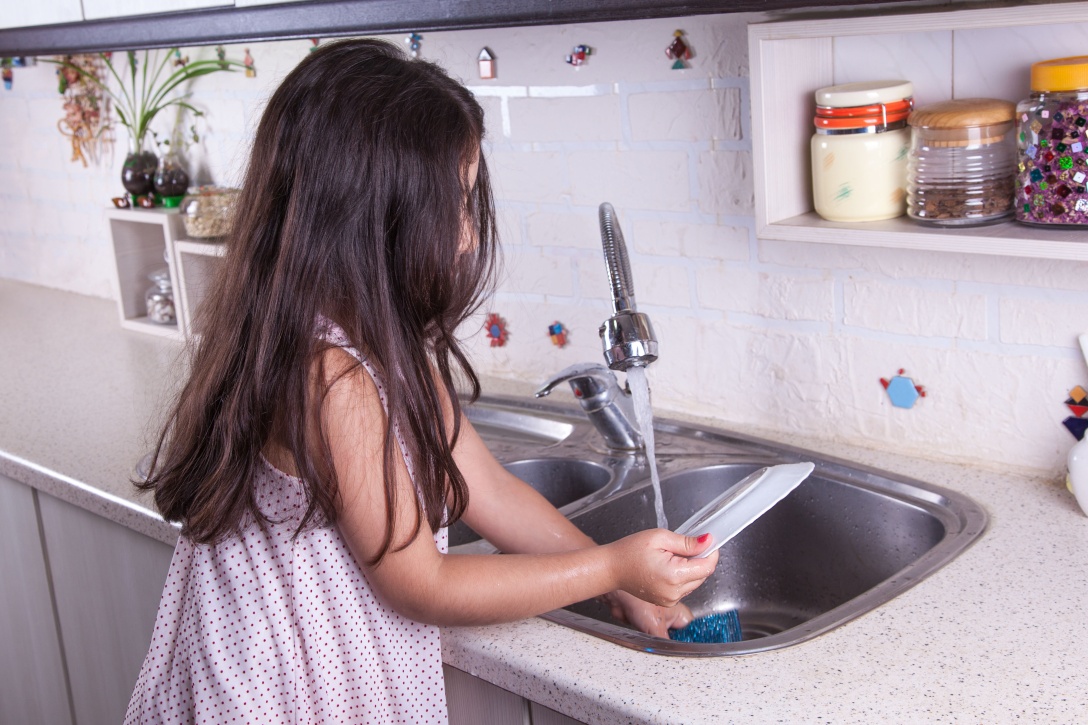
Responsibility is best taught in small doses across childhood. Think of gradually increasing expectations, ownership and chores overtime.
Responsible for belongings – A way to build a sense of responsibility is to have them gradually be responsible for their belongings. This means teaching them to keep their toys clean and all the pieces together, keep their floor reasonably clean and keep matching gloves throughout the winter.
This also means they are gradually responsible for their sports and activity supplies. At four and five years old, they should be helping you to pack their ballet or soccer supplies. By six and seven, you should be helping them pack their supplies. By eight and nine years old, they should be packing their own supplies. You might make them a checklist or a picture chart, but it’s important to encourage independence here.
In kindergarten and 1st grade, you can help pack up their school supplies and be sure they have what they need. By 2nd grade, they should be packing and you can check after. By 3rd grade, check every other day. By 4th grade, it’s theirs to do but check in occasionally, and offer more checking if they struggle.
Avoid rescuing them – If they lie to someone, have them talk to that person and fess up. If they take something from a store, even a small something have them return it and apologize. If they get a bad grade, focus the follow up on how they can improve and do better, and check in more as they go. Avoid working to get them out of it – speaking to the person about the lie for them, letting them keep the small thing or taking it back yourself, calling to ask to excuse the grade.
Avoid creating work for other people – This has been a mild mantra in our house. When the girls were little, we’d all spend a few minutes cleaning our mess before we left a restaurant. If you decide you don’t want something when you’re shopping, it has to go back to where it belongs.
Model and encourage work before play – Clean bedrooms before friends come over, and do chores before going out to a matinee.
Model and encourage helping others, even small acts of kindness – This may be shoveling a neighbor’s driveway, helping someone carry groceries or just checking in with a friend who’s been sick or is elderly.
Teach responsibility with volunteering and community efforts – This can be participating as a family with your school’s charity efforts, your church’s outreach programs or finding places and ways to volunteer together. The website our-kids.com has a resource list of places to volunteer as a family in the Northern Virginia and D.C.
Teach responsibility through chores – I like the idea of starting contribution, children being helpful throughout the day, by 18 months to two years old. They can carry small things to be helpful. By two-and-a-half they can match socks, they can set out spoons and napkins. By three-and-a-half, they can pour dog food and water plants.
By four or five years old, I like the idea of adding chores because they are part of the family. This is daily things like putting clothes in the hamper, putting plates in the sink or even helping make the bed, that are just expected and maybe charted, but not paid for. I particularly like pet care as a chore they do as part of the family. It encourages care for a living creature and responsibility to a relationship.
If you start there, by six or seven years old, I like the idea of adding paid chores. Keep contribution and a few chores they do to be part of the family, then, when you are ready, consider chores for allowance. Again, these are daily, otherwise they are things you keep track of and kids get paid weekly. If you lose the contribution and chores for family, it’s hard to get them to be helpful unless you pay them – and that’s not the goal.
As they get older, by nine or ten years old, you might be more flexible about chores. Maybe there’s a chore to do twice a week or a list of chores to pick from. It’s fine to get creative as long as everyone is aware of the new rules.
Prioritize school work, attendance and deadlines – It’s good to put homework or study time on the calendar daily, so kids see it’s importance. Encourage regular attendance. Help children to plan for and meet deadlines for projects and tests.
Encourage self care – Once your child can tie their own shoes, you are done tying their shoes. Have goals for self care. This may be getting dressed by five years old and taking showers independently by eight years old.
Be sure to set a good example – This includes keeping promises, showing up on time, taking care of your own belongings and keeping the house reasonably clean.
